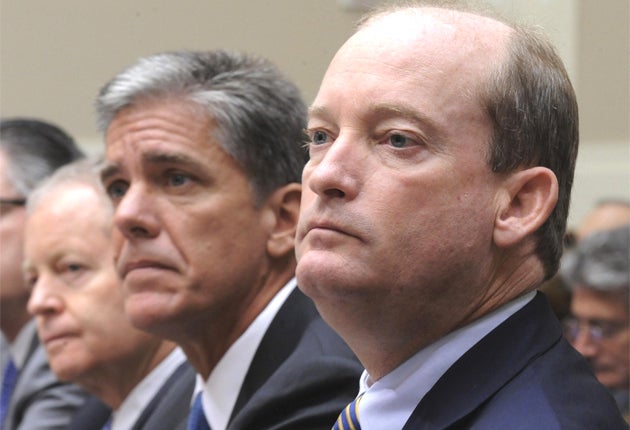Rival oil companies get a taste of BP's medicine on Capitol Hill

Your support helps us to tell the story
From reproductive rights to climate change to Big Tech, The Independent is on the ground when the story is developing. Whether it's investigating the financials of Elon Musk's pro-Trump PAC or producing our latest documentary, 'The A Word', which shines a light on the American women fighting for reproductive rights, we know how important it is to parse out the facts from the messaging.
At such a critical moment in US history, we need reporters on the ground. Your donation allows us to keep sending journalists to speak to both sides of the story.
The Independent is trusted by Americans across the entire political spectrum. And unlike many other quality news outlets, we choose not to lock Americans out of our reporting and analysis with paywalls. We believe quality journalism should be available to everyone, paid for by those who can afford it.
Your support makes all the difference.Members of Congress tore into the big energy corporations last night for filing almost identical Gulf of Mexico oil spill response plans – which included contact details for a deceased scientist and steps to protect a marine mammal not found in the region's waters.
It was an astonishing and sustained verbal battering which undermined attempts by Shell, ConocoPhillips and ExxonMobil to suggest that their working practices differ from those of BP; and that the catastrophe would not have happened if the leaking well had been theirs.
No one at yesterday's House Energy and Commerce Committee hearing suffered more, however, than Lamar McKay, chairman of BP America. He recoiled when he was repeatedly asked to apologise for the failure early on in the spill to accurately report the amount of crude gushing into the ocean.
An early BP document put the spill rate at between 1,000 and 14,000 barrels a day. A panel of US scientists offered grim news last night warning that the "most likely flow rate of oil today" ranges from 35,000 to 60,000 barrels per day – once more far higher than previously suggested. At the upper end of the range that would mean the equivalent of the Exxon Valdez spill is erupting from the well every four days. In another setback, BP said it had to interrupt collection of oil from the leak yesterday after a tanker on the surface was struck by a bolt of lightning, igniting a fire.
Barack Obama, meanwhile, returned to the White House after his two-day tour of coastal communities affected by the crisis in time to deliver his first Oval Office address since coming to power. While in Florida he has been confronted by protesters chanting: "Save our beach! Save our beach!"
The high-octane atmosphere at yesterday's hearing will doubtless give pause to Tony Hayward, the BP chief executive, who moves directly into the line of fire in Washington, first with a meeting with President Obama at the White House today, and with an appearance at another Capitol Hill hearing tomorrow.
Mr Obama was set last night to insist that BP create an independently managed, multibillion-dollar fund partly to improve the flow of cash to companies hurt by the spill. Referring to business owners, he promised yesterday to be "their fierce advocate in making sure that they are getting the compensation they need to get through".
Leading the questioning of energy executives, Ed Markey, a Democrat, focused on their spill response plans. "They cite identical response capabilities and tout identical ineffective equipment. In some cases, they use the exact same words," he said and then added: "Like BP, three other companies include references to protecting walruses, which have not called the Gulf of Mexico home for three million years."
BP's underestimate of the spill-rate in the early days of the disaster was either "deliberate deception or gross incompetence," Mr Markey suggested to Mr McKay. He went on: "You got it completely wrong either to limit your liability or out of incompetence."
Simultaneously, Mr McKay's peers tried to deflect fire from themselves with claims that BP had made mistakes they would have avoided, for example in ignoring warning signs at the well before it blew and in allegedly cutting corners in its design.
"A number of design norms that I would consider industry standards were not followed," testified Rex Tillerson of ExxonMobil. "We would not have drilled the well the way they did."
Transocean, the Swiss-based company which owned the doomed Deepwater Horizon rig, was put on the defensive last night following claims that it had registered the rig as belonging to the Marshall Islands, a tiny Pacific atoll, which had little capacity to make its own checks on safety and manning levels.
BP shares dived again yesterday after the international ratings agency Fitch slashed its rating close to junk, owing to soaring costs from the oil spill. The share price sank 3.78 per cent to close at 342 pence after Fitch cut BP's rating by six notches from AA to BBB, which is the agency's lowest investment grade.
Join our commenting forum
Join thought-provoking conversations, follow other Independent readers and see their replies
Comments